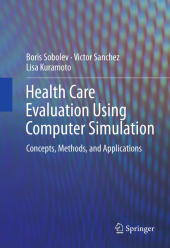 Neuerscheinungen 2014Stand: 2020-02-01 |
Schnellsuche
ISBN/Stichwort/Autor
|
Herderstraße 10
10625 Berlin
Tel.: 030 315 714 16
Fax 030 315 714 14
info@buchspektrum.de |

Lisa Kuramoto, Victor Sanchez, Boris Sobolev
(Beteiligte)
Health Care Evaluation Using Computer Simulation
Concepts, Methods, and Applications
2012. 2014. xxvi, 406 S. 108 Tabellen. 235 mm
Verlag/Jahr: SPRINGER, BERLIN; SPRINGER US; SPRINGER 2014
ISBN: 1-489-99322-3 (1489993223)
Neue ISBN: 978-1-489-99322-9 (9781489993229)
Preis und Lieferzeit: Bitte klicken
This book offers a comprehensive review of methodologies for creating computer simulations models to evaluate healthcare policy alternatives. Includes a variety of simulation approaches for modeling care processes: Markov, agent-based and discrete-event models.
The purpose of this book is to place computer simulation studies within the paradigm of intervention research that is concerned with comparing the outcomes of health care delivered under different policies. This book presents computer simulation as a tool for testing various policy alternatives that have been developed by decision-makers within health care systems. This approach differs from the use of computer simulation in operations research, where simulation helps determine the configurations of a system that will allow it to function optimally. Although simulation of health care processes is not new, few health care systems have used simulations as a basis for re-engineering the delivery of health services. There is growing appreciation that the complexity of health care processes exceeds the capacity of individual disciplines-health services research, health economics, or operations research-to guide health care reform. In this book, the authors focus on bringing the methodological rigor of evaluative research to the design and analysis of such simulation studies. The book is intended as a reference for health services researchers. It offers a comprehensive description of the methodology of conducting simulation studies in evaluation of service alternatives in surgical care using discrete-event models, including the steps for identifying the clinical and managerial activities of the perioperative process, determining the model requirements, implementing simulation models, designing simulation experiments and analyzing the experimental data, and interpreting and reporting results. The book also offers examples of specific aspects of conducting simulation experiments: how to determine the number of runs needed to estimate the effect of implementing a health care policy; how to allocate the number of runs to study groups in simulation experiments aiming to evaluate policy or management alternatives; and how to use statistical analysis to estimate, interpret, and report effect sizes.


